Best C++ Books in 2024 - Beginners to Advanced
C++ is a powerful and versatile programming language widely used in various fields, such as game development, system programming, and scientific computing. It provides high-level abstraction and low-level control, making it a popular choice for programmers. If you are new to C++ or looking to improve your skills, reading books can be a great way to learn and master the language. In this article, we have compiled a list of some of the best books on C++ for beginners as well as advanced programmers looking to brush up their skills and learn new techniques.
We organized our list of C++ books in following five categories.
Beginner Level C++ Books
If you are just starting out with C++, it is important to choose a book that explains the fundamentals clearly and concisely. Some of the best C++ books for beginners are:
C++ Primer (5th Edition)
Authors: Stanley B. Lippman, Josée Lajoie, and Barbara E. Moo
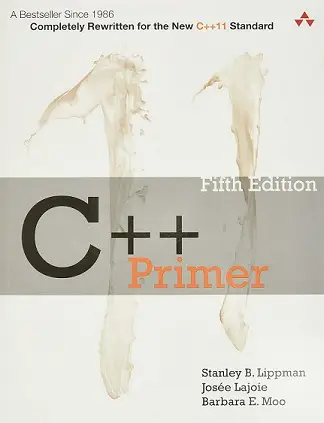
The book "C++ Primer" is a comprehensive guide suitable for beginners in C++, providing an authoritative exploration of fundamental C++ concepts and techniques. This book offers several benefits and key features that make it a popular choice among learners and programmers.
Key Features:
- Thorough Introduction: "C++ Primer" provides a thorough introduction to C++ programming from the ground up.
- In-Depth Coverage: It covers a wide range of topics, including basic syntax, data types, control structures, functions, classes, templates, and more.
- Hands-On Exercises: The book includes hands-on exercises and programming examples to reinforce learning and understanding.
- Clear and Concise Writing: The explanations are written in a clear and concise manner, making it easier for readers to follow and comprehend.
- Updated for Modern C++: It covers modern C++ features, ensuring that readers learn the most up-to-date practices and techniques.
- Companion Resources: Some editions include online resources, supplementary materials, or code samples to aid in learning and practice.
- Suitable for Self-Study or Classroom Use: Its structured approach and comprehensive content make it suitable for both self-study and classroom use.
- Fully Updated: The book is fully updated for C++ 11 standard.
Overall, "C++ Primer" is highly regarded for its comprehensive content, clear explanations, practical examples, and its ability to cater to readers at different skill levels, making it a valuable resource for learning C++.
Programming: Principles and Practice Using C++ (2nd Edition)
Author: Bjarne Stroustrup
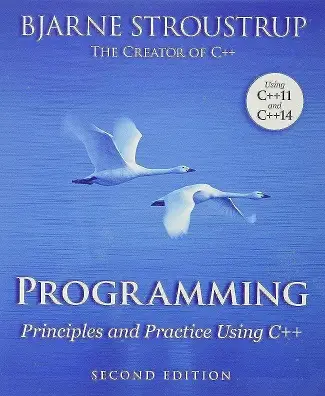
"Programming: Principles and Practice Using C++" by Bjarne Stroustrup, the creator of C++, offers several key features that set it apart as a valuable resource for learners:
Key Features:
- Focus on Principles: Emphasizes fundamental programming principles, making it suitable for beginners without prior programming experience.
- Introduction to Programming: Provides an introduction to programming concepts using C++, catering to individuals new to coding.
- Teaching with C++: Teaches programming techniques and principles using C++ as the primary language, enabling readers to understand both programming fundamentals and the C++ language concurrently.
- Problem-Solving Approach: Encourages a problem-solving approach to programming, teaching readers how to approach and solve problems effectively.
- Comprehensive Content: Covers a broad range of programming topics, including basics like data types, control structures, functions, and gradually progressing to more complex concepts.
- Application-Oriented Examples: Includes numerous practical examples and exercises that focus on applying programming principles in real-world scenarios.
- Modern C++ Features: Introduces readers to modern C++ features and best practices, ensuring they learn contemporary approaches to programming with C++.
- Companion Materials: Some editions may offer supplementary materials, code examples, exercises, and online resources to complement the learning experience.
- Accessible Language: Written in a clear and approachable style, making it understandable for beginners while still covering sophisticated topics.
- Versatile Learning Resource: Suitable for self-study, classroom use, or as a reference for individuals interested in learning programming with a focus on C++.
Overall, "Programming: Principles and Practice Using C++" is recognized for its comprehensive coverage of programming principles, its beginner-friendly approach, and its emphasis on practical application, making it a valuable resource for those learning programming using C++.
Introductory Level C++ Books
Once you have a good grasp of the fundamentals, you can move on to more advanced topics. Some great introductory books on C++ are:
Accelerated C++: Practical Programming by Example
Authors: Andrew Koenig and Barbara E. Moo
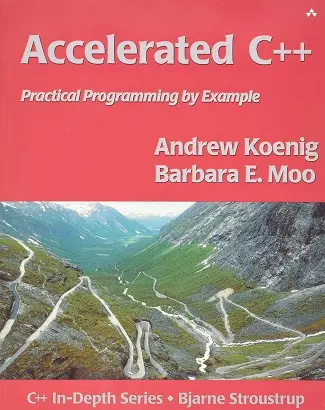
Focuses on teaching C++ through practical examples and hands-on exercises. This book is highly regarded for its unique approach and key features that cater to learners looking for a practical and hands-on introduction to C++ programming.
Key Features:
- Focused Learning Path: Emphasizes a fast-paced and practical approach to learning C++ programming, suitable for individuals looking to grasp the essentials quickly.
- Concise and Efficient: Provides a concise yet comprehensive coverage of essential C++ concepts, allowing readers to grasp core principles efficiently.
- Learning by Example: Utilizes numerous practical examples and exercises throughout the book, enabling readers to learn through hands-on coding experiences.
- Progressive Difficulty: Introduces progressively more advanced concepts, starting from basics and moving towards more complex topics, ensuring a smooth learning curve.
- Realistic Exercises: Includes exercises and programming problems that simulate real-world scenarios, encouraging problem-solving skills and practical application of knowledge.
- Modern Approach: Teaches traditional C++ techniques and modern practices, balancing foundational concepts and contemporary best practices.
- Accessible Language: Written clearly and approachable, making it accessible for beginners while covering important concepts effectively.
- Application-Oriented Content: Focuses on practical programming skills, enabling readers to build a strong foundation in C++ through hands-on coding.
- Use of Standard Library: Emphasizes the use of the C++ Standard Library, introducing readers to its functionalities and encouraging its utilization for efficient coding.
- Suitable for Self-Study: Ideal for self-study due to its practical examples and exercises, allowing readers to learn at their own pace.
"Accelerated C++: Practical Programming by Example" is praised for its pragmatic approach, practical examples, and focus on hands-on learning, making it a valuable resource for individuals aiming to learn C++ programming efficiently and effectively.
Effective Modern C++: 42 Specific Ways to Improve Your Use of C++11 and C++14
Author: Scott Meyers
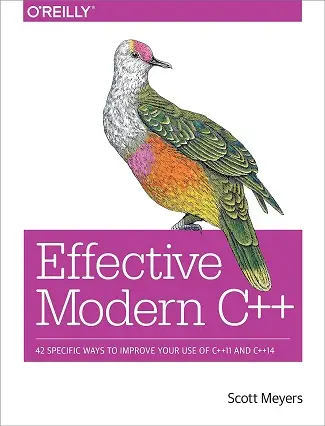
Offers insights into modern C++ features and best practices for programmers transitioning to newer versions. Here are its key features:
Key Features:
- Focus on Modern C++: Emphasizes the usage of modern features introduced in C++11 and C++14, providing insights into writing efficient and effective modern C++ code.
- Specific Guidelines: Offers 42 specific guidelines and recommendations, each addressing a particular aspect or feature of modern C++, aiding in enhancing code quality and performance.
- In-Depth Explanation: Provides in-depth explanations for each guideline, allowing readers to understand the rationale behind each recommendation.
- Real-World Examples: Includes real-world code examples illustrating the usage and implementation of each guideline, aiding in practical application.
- Updated Practices: Covers updated best practices and techniques relevant to the latest versions of C++, ensuring readers learn and adopt contemporary programming practices.
- Performance Improvement: Focuses on techniques that contribute to better performance, improved code readability, and reduced chances of errors.
- Clear and Concise Writing: Presents complex concepts clearly and concisely, making it accessible to many programmers, including intermediate to advanced users.
- Suitable for Experienced Programmers: Geared towards experienced C++ programmers seeking to enhance their skills and adapt to modern C++ standards.
- Comprehensive Coverage: Addresses a wide array of topics, including smart pointers, move semantics, lambda expressions, concurrency, and more, making it a comprehensive resource for modern C++ development.
- Valuable Insights: Offers valuable insights and expert advice based on the author's extensive experience in C++ programming.
"Effective Modern C++" is highly regarded for its detailed guidelines, practical advice, and emphasis on utilizing modern C++ features effectively. It is an essential read for C++ developers striving to improve their programming practices in the modern C++ era.
The C++ Programming Language
Author: Bjarne Stroustrup
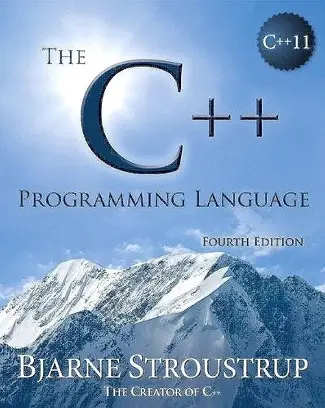
This is a comprehensive and authoritative book on the C++ programming language. Here are its key features:
Key Features:
- Authoritative Source: Authored by Bjarne Stroustrup, the creator of C++, making it an authoritative and trusted reference for the language.
- Comprehensive Coverage: Provides extensive coverage of the C++ language, encompassing its syntax, features, standard libraries, and advanced concepts.
- In-Depth Explanations: Offers detailed explanations of language features, programming techniques, and design principles, suitable for both beginner and experienced programmers.
- Evolution of C++: Covers the evolution of the C++ language, discussing various versions, enhancements, and standards, including the latest updates.
- Core Concepts and Advanced Topics: Explores both fundamental concepts and advanced topics such as templates, exceptions, concurrency, and object-oriented programming in depth.
- Code Examples: Includes numerous code examples and illustrations demonstrating C++ programming constructs and best practices.
- Standard Library Reference: Provides a comprehensive reference to the C++ Standard Library, detailing its components and usage.
- Design and Programming Guidelines: Offers guidelines on effective C++ programming, software design principles, and best practices for writing efficient and maintainable code.
- Suitable for Various Audiences: Accommodates readers at different skill levels, serving as a valuable resource for beginners learning the language and experienced programmers seeking in-depth knowledge.
- Insights from the Language Creator: Provides insights into the design rationale, philosophy, and vision behind the C++ language from its creator.
"The C++ Programming Language" is highly regarded as an indispensable resource for anyone seeking a deep understanding of C++. It serves as a tutorial for newcomers to the language and a comprehensive reference for seasoned C++ developers, offering insights into the language's design, evolution, and best practices.
C++ Crash Course: A Fast-Paced Introduction
Author: Josh Lospinoso
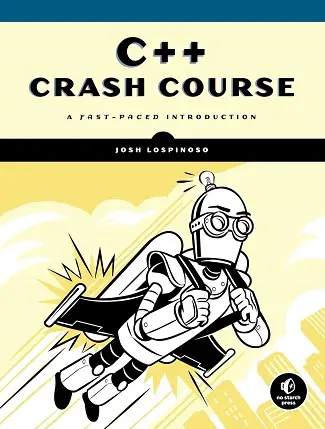
This book is designed to provide a quick yet comprehensive introduction to C++ programming. Here are its key features:
Key Features:
- Concise Introduction: Offers a fast-paced and concise introduction to C++ programming, ideal for beginners and programmers familiar with other languages.
- Comprehensive Coverage: Covers fundamental C++ concepts, syntax, and features necessary to start programming in C++, including variables, control structures, functions, classes, and templates.
- Practical Approach: Emphasizes a hands-on and practical approach with coding examples and exercises that reinforce learning and understanding.
- Modern C++ Practices: Includes coverage of modern C++ practices and features, introducing readers to up-to-date techniques and idioms in C++ programming.
- Focused on Essentials: Focuses on essential C++ topics for building a strong foundation, omitting complex and specialized topics to streamline the learning process.
- Clear and Accessible Language: Presents complex concepts in a clear and understandable manner, making it accessible for beginners while covering important aspects effectively.
- Real-World Examples: Provides practical examples and code snippets to illustrate concepts, enabling readers to apply their knowledge in real programming scenarios.
- Project-Based Learning: Incorporates project-based learning exercises to apply learned concepts in creating simple applications or programs.
- Suitable for Self-Study: Designed for self-study, allowing readers to learn at their own pace and providing a structured approach to mastering C++ basics.
- Foundation for Further Learning: A stepping stone for further exploration into advanced C++ topics or more in-depth learning resources.
"C++ Crash Course" is highly regarded for its concise and practical approach, making it an excellent starting point for individuals new to C++ programming or those transitioning from other programming languages. It serves as a solid foundation for understanding the essentials of C++ programming swiftly and effectively.
Best Practices C++ Books
To become a proficient C++ programmer, it is important to learn the best practices and coding techniques used by experienced developers. Some of the best books in this category are:
Effective C++: 55 Specific Ways to Improve Your Programs and Designs
Author: Scott Meyers
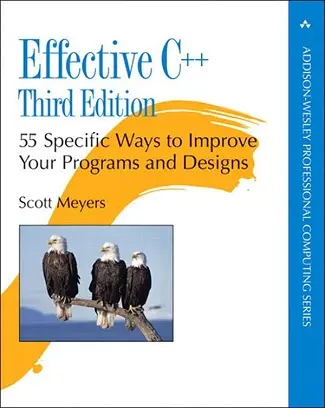
This is a highly acclaimed book that offers valuable insights and best practices for writing efficient and robust C++ code. Here are its key features:
Key Features:
- Guidelines and Techniques: Presents 55 specific guidelines, techniques, and recommendations for writing better C++ code, focusing on improving program design, performance, and reliability.
- Practical Advice: Offers practical advice based on real-world scenarios and experience, helping programmers apply best practices effectively in their projects.
- Clear and Concise Recommendations: Provides clear and concise explanations for each guideline, making complex concepts understandable and actionable for programmers.
- In-Depth Explanations: Offers detailed explanations with the reasoning behind each guideline, allowing readers to understand the rationale behind the suggested practices.
- Code Examples: Includes illustrative code examples demonstrating good and bad practices, aiding in better comprehension and practical application.
- Coverage of Core C++ Concepts: Covers a wide range of fundamental C++ concepts, including object-oriented programming, resource management, inheritance, templates, and more.
- Updated Content: Updated editions cover newer C++ standards and best practices, ensuring relevance to contemporary C++ programming.
- Suitable for Various Skill Levels: Useful for programmers at different skill levels, from intermediate to advanced, looking to enhance their C++ programming skills and design principles.
- Performance Enhancement: Focuses on improving code performance, reliability, maintainability, and scalability through recommended practices.
- Authoritative Source: Authored by Scott Meyers, a renowned expert in C++ programming, providing authoritative and trusted advice.
"Effective C++" is widely appreciated for its wealth of practical advice, clear explanations, and actionable recommendations that help programmers improve their programming skills and design practices in C++. It remains a go-to resource for developers who write efficient and high-quality C++ code.
More Effective C++: 35 New Ways to Improve Your Programs and Designs
Author: Scott Meyers
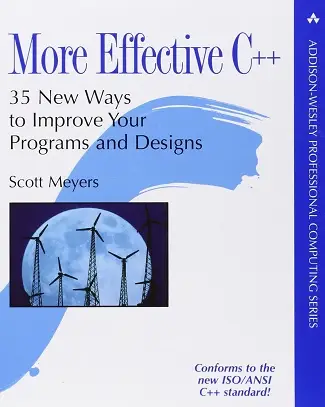
This is a follow-up to his previous book, "Effective C++," offering further insights and recommendations for writing better C++ code. Here are its key features:
Key Features:
- Additional Guidelines: Provides 35 new guidelines and techniques to supplement the recommendations covered in "Effective C++," offering further insights into writing high-quality C++ code.
- Continuation of Best Practices: Expands upon the best practices introduced in "Effective C++" while delving into additional programming techniques and design principles.
- Focused Advice: Offers focused and concise advice on various aspects of C++ programming, covering object-oriented design, resource management, templates, and more.
- Clear and Practical Examples: Includes clear and practical code examples to illustrate the principles discussed, aiding in better understanding and applying the recommended practices.
- Insights from Real-World Scenarios: Provides insights based on real-world scenarios and experiences, helping programmers apply advanced C++ techniques effectively in their projects.
- Complementary Resource: Serves as a complementary resource to "Effective C++," allowing readers to expand their knowledge and proficiency in C++ programming.
- In-Depth Explanations: Offers in-depth explanations and reasoning behind each guideline, enabling readers to grasp the rationale behind the suggested practices.
- Authoritative Source: Written by Scott Meyers, a renowned authority in the field of C++ programming, ensuring the advice is authoritative and reliable.
- Suitable for Intermediate and Advanced Programmers: Geared towards intermediate to advanced programmers looking to deepen their understanding of advanced C++ concepts and enhance their programming skills.
"More Effective C++" builds upon the foundation "Effective C++" laid, offering additional guidelines and insights to refine programming techniques and design practices in C++. It is a valuable resource for programmers seeking to elevate their proficiency in C++ programming.
Intermediate Level C++ Books
Some good intermediate level books on C++ are:
The C++ Programming Language" by Bjarne Stroustrup
Author: Bjarne Stroustrup
Written by the creator of C++, is considered a definitive and comprehensive resource on the C++ language. Here are its key features:
Key Features:
- Authoritative Reference: Authored by Bjarne Stroustrup, the creator of C++, making it an authoritative and trusted source of information on the language.
- Comprehensive Coverage: Provides comprehensive coverage of the C++ language, including its syntax, core features, standard libraries, and advanced concepts.
- In-Depth Explanations: Offers detailed explanations of language features, programming techniques, and design principles, catering to both beginner and experienced programmers.
- Evolution of C++: Covers the evolution of the C++ language, discussing various versions, enhancements, and standards, including the latest updates.
- Core Concepts and Advanced Topics: Explores both fundamental concepts and advanced topics such as templates, exceptions, concurrency, and object-oriented programming in depth.
- Code Examples: Includes numerous code examples and illustrations demonstrating C++ programming constructs and best practices.
-
Standard Library Reference: Provides a comprehensive reference to the C++ Standard Library, detailing its components and usage.
- Design and Programming Guidelines: Offers guidelines on effective C++ programming, software design principles, and best practices for writing efficient and maintainable code.
- Suitable for Various Audiences: Accommodates readers at different skill levels, serving as a valuable resource for beginners learning the language and experienced programmers seeking in-depth knowledge.
- Insights from the Language Creator: Provides insights into the design rationale, philosophy, and vision behind the C++ language from its creator.
"The C++ Programming Language" is highly regarded as an indispensable resource for anyone seeking a deep understanding of C++. It serves as a tutorial for newcomers to the language and a comprehensive reference for seasoned C++ developers, offering insights into the language's design, evolution, and best practices.
Modern C++ Design: Generic Programming and Design Patterns Applied
Author: Andrei Alexandrescu
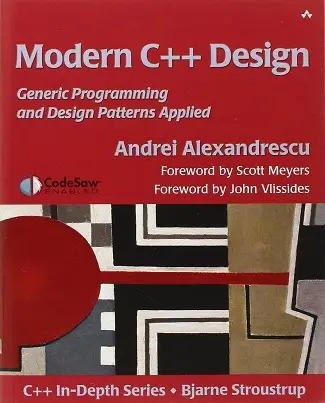
This is a renowned book that delves into advanced C++ programming techniques, emphasizing generic programming and design patterns. Here are its key features:
Key Features:
- Focus on Generic Programming: Emphasizes the principles of generic programming in C++, showcasing techniques for creating flexible and reusable software components.
- In-depth Exploration: Explores advanced C++ concepts, including template metaprogramming, policy-based design, and compile-time computations.
- Applied Design Patterns: Demonstrates the application of design patterns within the context of generic programming, illustrating their usage in modern C++.
- Policy-Based Design: Focuses on the policy-based design approach, allowing developers to create highly customizable and adaptable software components.
- Template Metaprogramming (TMP): Discusses template metaprogramming techniques, showcasing how to leverage the C++ template system for compile-time computations and optimizations.
- Advanced Techniques: Covers advanced programming techniques, such as type traits, function binding, template specialization, and expression templates.
- Real-World Examples: Provides real-world examples and case studies to illustrate the implementation of generic programming techniques and design patterns.
- Optimization and Flexibility: Explores ways to achieve optimization and flexibility through generic programming, enhancing code efficiency and maintainability.
- Comprehensive Insights: Offers comprehensive insights into leveraging C++ features for creating high-performance and flexible software systems.
- Suitable for Advanced Developers: Geared towards experienced C++ programmers and software architects seeking to deepen their understanding of modern C++ techniques and design patterns.
"Modern C++ Design" is highly regarded for exploring advanced C++ programming paradigms, offering valuable insights into leveraging generic programming and design patterns to create efficient and flexible software components. It is an essential resource for developers aiming to master advanced C++ concepts and apply them to real-world projects.
Advanced level C++ Books
Finally, for experienced C++ programmers who want to expand their knowledge and learn advanced concepts, these books are highly recommended:
C++ Concurrency in Action
Author: Anthony Williams
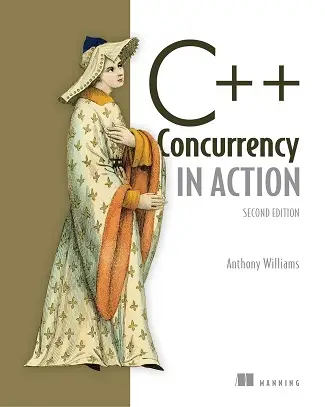
"C++ Concurrency in Action" by Anthony Williams is a comprehensive book focusing on concurrent and multithreaded programming in C++. Here are its key features:
Key Features:
- Thorough Coverage of Concurrency: Provides comprehensive coverage of concurrent programming concepts, multithreading, and synchronization mechanisms in C++.
- Practical Examples: Offers numerous practical examples and exercises demonstrating the application of concurrency techniques in C++ programming.
- Concurrency Support in C++: Explores the concurrency support introduced in the C++11 standard and subsequent versions, including threads, mutexes, condition variables, atomics, and futures.
-
Thread Management: Covers thread management, synchronization primitives, and concurrent data structures, aiding in building thread-safe applications.
- Best Practices: Discuss best practices and common pitfalls in concurrent programming, offering guidelines for writing safe and efficient concurrent code.
- Portable and Platform-Independent Techniques: Emphasizes portable and platform-independent concurrency techniques, allowing developers to write concurrent code that can run on various systems.
- Concurrency Design Patterns: Explores various concurrency design patterns and idioms used to solve common problems encountered in multithreaded programming.
- Performance Considerations: Addresses performance considerations and optimizations related to concurrent programming, enabling developers to write efficient concurrent code.
- Real-World Applications: Demonstrates the application of concurrency concepts in real-world scenarios, addressing challenges and providing solutions for concurrent programming problems.
- Suitable for Intermediate to Advanced Programmers: Geared towards intermediate to advanced C++ developers interested in mastering concurrent programming techniques and principles.
"C++ Concurrency in Action" is highly regarded for its comprehensive coverage of concurrent programming in C++, offering practical guidance, examples, and best practices for writing efficient and thread-safe applications. It is an essential resource for developers aiming to understand and implement concurrency in their C++ projects.
Effective STL: 50 Specific Ways to Improve Your Use of the Standard Template Library
Authors: Scott Meyers
"Effective STL: 50 Specific Ways to Improve Your Use of the Standard Template Library" by Scott Meyers is a highly regarded book that provides specific guidelines to enhance the C++ Standard Template Library (STL) utilization. Here are its key features:
Key Features:
- Focused Guidance: Offers 50 targeted guidelines and recommendations for optimizing STL containers, algorithms, and utilities.
- Practical Advice: Provides practical and actionable advice on using STL components effectively to improve code quality and performance.
- Insightful Explanations: Offers insightful explanations behind each guideline, outlining the reasoning and potential implications of specific STL usage patterns.
- STL Containers and Algorithms: Covers a broad range of STL containers (e.g., vectors, lists, maps) and algorithms, showcasing effective ways to utilize them in programming tasks.
- Best Practices: Emphasizes best practices for using STL features efficiently, addressing concerns related to performance, correctness, and maintainability.
- Performance Enhancement: Focuses on techniques and strategies to optimize performance when working with STL containers and algorithms.
- Real-World Examples: Illustrates practical usage of STL components through real-world examples and scenarios, demonstrating how to apply the guidelines effectively.
- Intermediate to Advanced Content: Geared towards intermediate to advanced C++ programmers seeking to deepen their understanding and proficiency in leveraging the STL effectively.
- Authoritative Source: Authored by Scott Meyers, a respected authority in C++ programming, ensuring reliable and authoritative insights into utilizing the STL.
- Comprehensive Resource: A comprehensive guide to refining STL usage, offering valuable insights and practical recommendations for experienced developers.
"Effective STL" is highly regarded for its specific and actionable advice, providing programmers with targeted guidelines to enhance their utilization of the C++ Standard Template Library. It remains a valuable resource for programmers aiming to optimize their use of STL components and write more efficient and effective C++ code.
Modern C++ Design: Generic Programming and Design Patterns Applied
Author: Andrei Alexandrescu
This is a renowned book focusing on advanced C++ programming techniques, particularly generic programming and design patterns. Here are its key features:
Key Features:
- Focus on Generic Programming: Emphasizes the principles of generic programming in C++, showcasing techniques for creating flexible and reusable software components.
- In-Depth Exploration: Explores advanced C++ concepts, including template metaprogramming, policy-based design, and compile-time computations.
- Applied Design Patterns: Demonstrates the application of design patterns within the context of generic programming, illustrating their usage in modern C++.
- Policy-Based Design: Focuses on the policy-based design approach, allowing developers to create highly customizable and adaptable software components.
- Template Metaprogramming (TMP): Discusses template metaprogramming techniques, showcasing how to leverage the C++ template system for compile-time computations and optimizations.
- Advanced Techniques: Covers advanced programming techniques, such as type traits, function binding, template specialization, and expression templates.
- Real-World Examples: Provides real-world examples and case studies to illustrate the implementation of generic programming techniques and design patterns.
- Optimization and Flexibility: Explores ways to achieve optimization and flexibility through generic programming, enhancing code efficiency and maintainability.
- Comprehensive Insights: Offers comprehensive insights into leveraging C++ features for creating high-performance and flexible software systems.
- Suitable for Advanced Developers: Geared towards experienced C++ programmers and software architects seeking to deepen their understanding of modern C++ techniques and design patterns.
"Modern C++ Design" is highly regarded for exploring advanced C++ programming paradigms, offering valuable insights into leveraging generic programming and design patterns to create efficient and flexible software components. It is an essential resource for developers aiming to master advanced C++ concepts and apply them to real-world projects.
C++ Templates: The Complete Guide
Authors: David Vandevoorde and Nicolai M. Josuttis
This is a comprehensive book focusing on C++ templates, covering various aspects and intricacies of template metaprogramming. Here are its key features:
Key Features:
- In-Depth Coverage: Provides extensive coverage of C++ templates, including their syntax, usage, and advanced template metaprogramming techniques.
- Understanding Template Fundamentals: Explains the fundamentals of C++ templates, including template classes, functions, template specialization, and template instantiation.
- Template Metaprogramming (TMP): Covers advanced template metaprogramming techniques, such as template specialization, traits, type manipulation, and template-based computation.
- Template Libraries: Discusses the development and usage of template libraries, including the Standard Template Library (STL) and Boost libraries, exploring their implementations and usage of templates.
- Template-Based Design Patterns: Explores the application of design patterns and idioms using templates, demonstrating their implementation and usage in practical scenarios.
- Advanced Techniques: Covers advanced template features and techniques, including variadic templates, template template parameters, SFINAE (Substitution Failure Is Not An Error), and more.
- Performance Considerations: Addresses performance considerations and optimizations related to template usage, guiding readers on writing efficient template-based code.
- Standard Compliance: Aligns with the C++ standard specifications, including updates and enhancements in newer C++ versions to ensure relevance and compliance.
- Real-World Examples: Provides numerous real-world examples and case studies to illustrate the use of templates in practical programming scenarios.
- Suitable for Intermediate to Advanced Programmers: Geared towards intermediate to advanced C++ programmers seeking a deep understanding of templates and template metaprogramming.
"C++ Templates: The Complete Guide" is highly regarded for its comprehensive coverage of C++ templates, offering valuable insights into template usage, metaprogramming techniques, and their practical application. It serves as an essential resource for developers aiming to master the intricacies of C++ templates and their utilization in software development.
Note:
- It's important to choose books based on your current skill level and learning objectives. For absolute beginners, starting with introductory books is recommended.
- Supplement your learning with practical coding exercises and projects to reinforce your understanding of C++ concepts.
These books cover various aspects of C++ programming, from beginner to advanced levels, and can serve as valuable resources for programmers looking to enhance their C++ skills.
Related articles and courses:
Course: FREE C++ Programming Course for Beginners